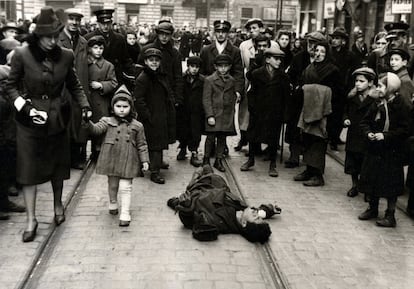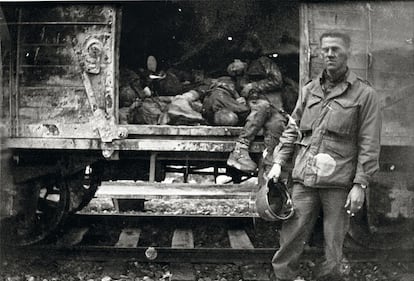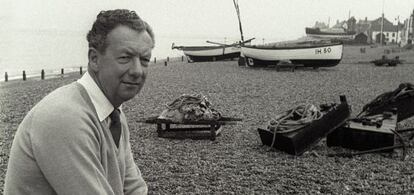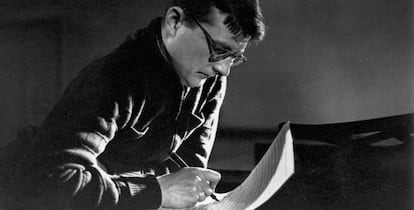One autumn morning in 1827, Johann Wolfgang von Goethe sat down to eat roast partridges for lunch in the shade of a leafy oak tree on the outskirts of Weimar and said: “Here one feels bigger and freer.” One hundred and ten years later, a group of prisoners arrived at that place to cut down the forest and build the Buchenwald concentration camp. The Nazis saved a tree from felling: Goethe’s famous oak, which remained in the heart of that hell until it was destroyed by a bombing in 1944. A communist prisoner preserved a piece of the oak and carved a suffering face on it that is today preserved in a German museum.
This story, which so well reflects the utopian promise of European culture and its indelible connection with barbarism, opens The echo of time (Paidos), a beautiful essay that the journalist Jeremy Eichler has just published in Spanish. The book investigates the creation of four musical works created to commemorate the Second World War and the Holocaust: Metamorphosis by Richard Strauss; A Warsaw survivor, by Arnold Schoenberg; he war requiem, by Benjamin Britten; and the Babi Yar Symphony by Dmitri Shostakovich.
“We remember music, but music also remembers us and is capable of creating these ineffable truths about other times and making them reach our days,” Eichler, who began working on the book almost ago, says during a telephone conversation. two decades and that is critical in The Boston Globe.
In The echo of time A certain urgency is perceived due to the disappearance of the last generation that lived through the Holocaust and the will to demand deep listening, in the antipodes of those who conceive music as a mere musical thread. “I wanted to investigate the way in which each country has told what happened,” says the author. “I also wanted to choose composers whose works had had premieres full of stories that allowed the reader to experience that moment as if looking through a keyhole.”
At the center of the first part of the book beats the belief in the Bildung, an elusive term that designates the ideal of thousands of German Jews who believed in the power of the humanities to ennoble the soul. No musician embodied that ideal better than Felix Mendelssohn, a composer of Jewish origin who rescued Bach’s religious music from oblivion, created very popular works and reached the top of the German musical Olympus.
The city of Leipzig honored his memory in 1892 with a statue destroyed by the Nazis and in 1937 thousands of Jews heard his oratorio. Elijah in a Berlin synagogue on an elegiac evening that Eichler describes in the book as the swan song of that world of yesterday. The book includes many versions of the tragic end of the ideal of Bildung: from the suicide of Stefan Zweig and his wife in Brazil to the extermination of the violinist Alma Rosé in Auschwitz. “They are devastating stories that help us understand a broader paradox: that the same minority that placed its hopes in the salvation offered by that ideal was ultimately the target of that genocidal madness,” says Eichler, whose essay tells that end through two opposite poles: a Strauss attracted to Nazism and a Schoenberg who perceived its threat long before those around him.

In the case of Strauss, the book focuses on the birth of Metamorphosis, a short work for 23 string instruments that he composed out of remorse between 1944 and 1945, along with a bust of Glück that Goebbels gave him and a portrait of a Jewish relative who died in an extermination camp. The author of the book, however, has not had access to part of the musician’s archive, which the family continues to keep secret even today.
“Strauss is a perfect example of the blinding power of the artistic ego,” says Eichler. “Reading the correspondence with his librettist Zweig allows you to see how the symbiosis between Jews and Germans dissolves line after line before your eyes. Strauss’s ego does not allow him to recognize the humanity or suffering of a person with whom he worked so closely.
At the other extreme is the epic of Schoenberg, who emigrated to the United States fleeing likely persecution, returned to Judaism long after his Lutheran baptism, and imagined himself as a kind of messiah in the late 1930s. “He was convinced that he was a kind of Moses who was going to push German music into the future,” says Eichler. “When that future was blown up, he thought about saving his people from Nazism.”

eeks earlier.
The musician even sent Thomas Mann a letter asking for help in publishing an anti-Nazi manifesto in December 1938, when the leaders of France and the United Kingdom still thought it was possible to appease Hitler. Mann ignored his request. The failure of that endeavor and the extermination of cousins and nephews who did not manage to flee Europe pushed Schoenberg to create A Warsaw survivora piece of about seven minutes that he composed in one sitting in August 1947.
The work is the first sound memorial to the Holocaust and Schoenberg composed it when there were hardly any public monuments dedicated to the Nazi extermination. Ignored by the famous conductor Serge Koussevitzky, it ended up being premiered in a university gymnasium in Albuquerque (New Mexico) with an amateur orchestra and a cowboy choir, although surprisingly under the baton of a Viennese conductor based in the city.
A Warsaw survivor It opens with the testimony of a narrator who tells how several Jewish prisoners are beaten before being sent to the gas chamber and closes with a defiant male choir singing the Shema Israel, the most sacred prayer in Judaism.
“At that time other musicians were seeking to give music back its beauty and restore its humanity, and this work does just the opposite,” explains Eichler. “[El filósofo Theodor] Adorno compared him to Guernica because it takes the barbarity of history and puts it squarely within the framework of the work of art itself.”
The second part of the book intertwines the stories of the Englishman Britten and the Russian Shostakovich, two very different men and yet united by enormous mutual admiration at the end of their days.
Britten’s pacifism pushed him to become a conscientious objector. He did not see the horror of Nazism until a few months after liberation, when he performed a program of Bach and Mendelssohn alongside Jewish violinist Yehudi Menhin for survivors of the Bergen Belsen camp. At the end of his life he would tell his partner, the tenor Peter Pears, that that visit transformed all the music he composed since then.
Britten was chosen to compose war requiemthe musical work with which the new Coventry Cathedral was consecrated in 1962, built next to the ruins of the Gothic temple destroyed in 1940 by a German bombing that carried the code name of Moonlight, one of Beethoven’s best sonatas. Britten composed a shocking work in which between text and liturgical text he intersperses the verses of Wilfred Owen, a young poet who fought in the Great War and who was killed in France in 1918 a week before the armistice.

Only one of the premiere’s soloists had military experience, bass Dietrich Fischer-Dieskau, who served in the German Army and lost a disabled brother to the cruelty of Nazi eugenics. At the end of the concert, he sat in the choir while the temple emptied. “I was devastated,” he later recalled. “I couldn’t get so many dead friends out of my mind.”
Almost at the same time, on the other side of the world, Shostakovich was creating an audio memorial dedicated to a Nazi massacre that the USSR had worked hard to hide. As many as 33,771 Jews were murdered in just two days in September 1941 in Babi Yar, a ravine outside the city of kyiv.
Clear memory
At first Stalin thought it would be useful for him to document the Holocaust and had authors Ilyá Ehrenburg and Vasili Grossman collect testimonies for the black book. But in August 1947, with the book already in print and while Schoenberg was composing in California A Warsaw survivorthe order was given to stop publication.
The focus on that Jewish tragedy did not fit with the regime’s growing anti-Semitism or with the story of the patriotic crusade. In Babi Yar, the memory of the massacre was erased by first filling in the ravine and then building a dam that collapsed in March 1961, killing hundreds of people.
A few months later, the young poet Evgueni Evtuchenko visited the area with the writer Anatoly Kuznetsov, who would later document the massacre. From that visit the poem was born Babi Yarwhich Shostakovich read in a Moscow magazine and which would be the basis of his Symphony No. 13 in B flat minor.
By then the composer was a man increasingly distressed by the regime’s harassment. An atheist and without Jewish ancestors, he had, however, experienced Soviet anti-Semitism very closely due to the arrest of close Jewish intellectuals.

His Piano Trio No. 2 (1944) included nods to Jewish popular music and can be conceived as one of the first tributes to the memory of the Holocaust. But his symphony was a much more powerful political statement, unequivocally addressing an episode that the regime had ordered to be forgotten.
Scars
“Shostakovich was the great narrator of the 20th century with his utopias and his deepest nightmares,” says Eichler. “His symphony shows how this art form can create a place to remember those without a grave. One of the messages of the book is that the ephemeral nature of music is also one of its strengths. Stone monuments are destroyed and books are burned, but music is untouchable.”
The symphony was performed for the first time in Moscow in December 1962 despite the threat of censorship and the anger of Nikita Khrushchev, who furiously criticized the poem on the eve of the
premiere. It came to the West from the hand of Mstislav Rostropovich, who took the score from the USSR by tearing the first page and hiding it in a suitcase, and led to its premiere in Philadelphia in 1970. Even so, the symphony did not make its way equally everywhere. The Berlin Philharmonic only premiered it in 1983. The Vienna Philharmonic has never performed it.
The book concludes next to the stump of Goethe’s oak tree, today filled with pebbles in memory of the victims of Buchenwald, and at the foot of the Mendelssohn monument, rebuilt in Leipzig in 2008 along with its original motto: “Let the language of music speak.” only of noble things.”
Does that wish still make sense? Eichler asks how we should perceive the music that was born from that ideal after the Holocaust. “We cannot or should not listen to a work like Beethoven’s Ninth without hearing the scars that have been inflicted on it or the history through which it has come to us,” he says. “To listen to that music without those scars is to reduce it to a kind of kitsch of freedom.”
All the culture that goes with you awaits you here.
Subscribe
Babelia
The literary news analyzed by the best critics in our weekly newsletter
RECEIVE IT
Subscribe to continue reading
Read without limits
_
#memory #World #War #Holocaust #left #music